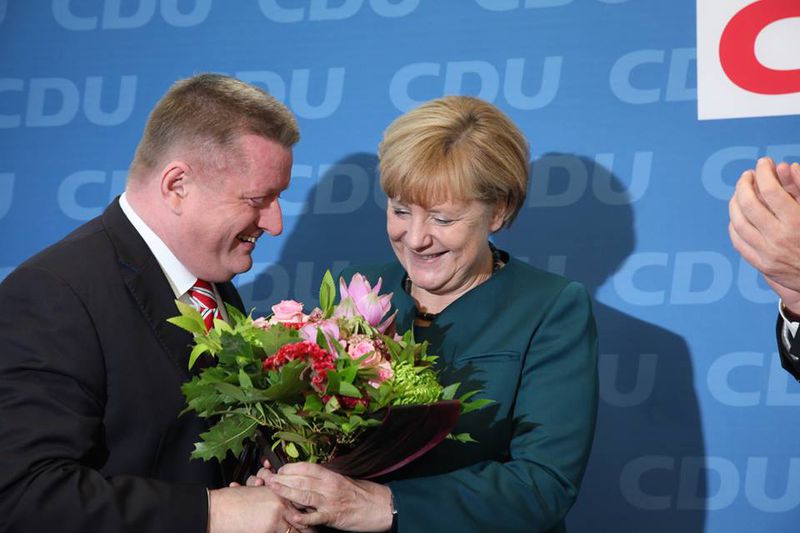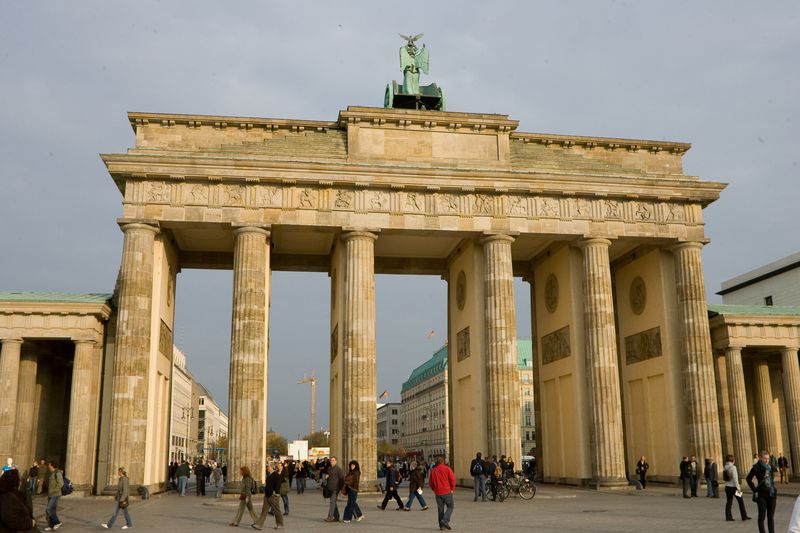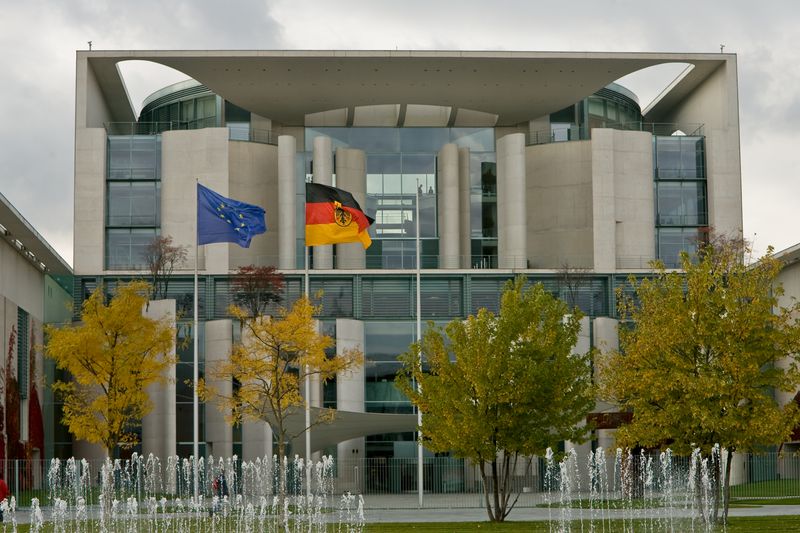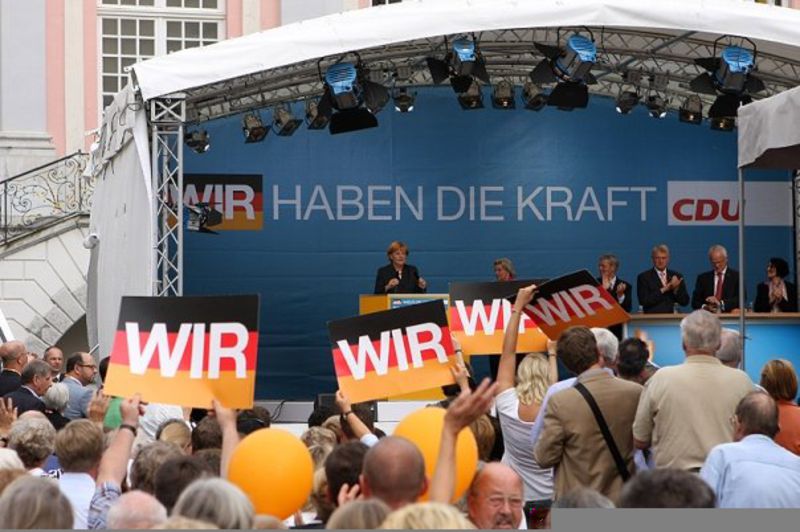The Germans Asked for Super Mutti and Got Her
Adelina Marini, October 1, 2013
 The main motor of the EU is working well, unfailingly, predictably and most of all steadfastly. The driver remains the same and it seems she will continue the stable course of the small steps. Generally, this is how the federal elections in Germany can be summarised that offered few surprises, if any. On the one hand, it was unexpected that Angela Merkel's party (Christian Democratic Union and Christian Social Union) was be on the verge of winning an absolute majority, at least for couple of hours, especially after two full terms of coalition government, but on the other hand - this is not as surprising. The big surprise was that the Liberals (FDP) remained outside parliament.
The main motor of the EU is working well, unfailingly, predictably and most of all steadfastly. The driver remains the same and it seems she will continue the stable course of the small steps. Generally, this is how the federal elections in Germany can be summarised that offered few surprises, if any. On the one hand, it was unexpected that Angela Merkel's party (Christian Democratic Union and Christian Social Union) was be on the verge of winning an absolute majority, at least for couple of hours, especially after two full terms of coalition government, but on the other hand - this is not as surprising. The big surprise was that the Liberals (FDP) remained outside parliament.
The campaign was one of the most boring, after the opinion of many analysts, but also the most closely followed all over Europe and even beyond, due to important role Germany plays for its future. In this sense, the elections can be seen as indicative for the European moods in Germany just days after the European Parliament launched the first in its history large scale campaign for the European elections in May next year. The importance of the German elections as if strongly underestimated the scale of the elections for MEPs and put forward the dilemma about how important in a common EU aspect national elections can be vs. how unimportant nationally common European elections can be.
Precisely because of the opposition national vs. common European, that will dominate the European campaign next year, euinside turned for analysis of the elections in Germany to Bulgarian journalists, analysts and politically active citizens who live in the country and have a direct view on the events there.
A surprise or not?
Kapka Todorova, a correspondent in Germany of one of the big Bulgarian daily newspapers - 24 hours - believes that the elections were both surprising and not that unexpected as an outcome. "After all, Angela Merkel's victory was expected much before the voting, when all polls were giving her 50% approval and made her one of the most liked chancellors in the country. A surprise is the drop out of the recent coalition partner - the Liberal Free Democratic Party (FDP) - who failed to jump over the 5-percent threshold. Merkel herself, however, was surprised by the probability, albeit for several hours, to govern with absolute majority. She came short of 4 seats to do that".
Vessela Kulev, a political scientist and journalist who works as a consultant and analyst with the Institute for Political Strategies in Bremen, presented several facts in support of the claim that the outcome was a surprise. "Although the polls pointed to a victory of the Christian Democrats, no one expected almost a complete victory for Angela Merkel's party who came short of 0.5% to be able to govern by herself, which was achieved only once in the history of the federal republic - by Adenauer. It was also envisaged the Greens and the extreme Left to lose votes, but not with so distinctive percentage difference. The expectations (and fears) that the anti-European Alternative for Deutschland (AfD) would enter the Bundestag did not come true and the forecasts the Pirate Party would succeed in entering with a minimum result were also not realised".
Ms Kulev is also of the opinion that the biggest surprise and even a shock was for the neo liberals, a recent permanent and most desired partner of the CDU and especially for Merkel. "For the first time in the history of FRG the Liberals remain without parliamentary representation - they were short of 0.2 per cent to be able to cross over the minimum threshold of 5 per cent. The drama is big given that the biggest tax reliefs and specific reforms in a number of political and economic sectors came in the past years precisely from the block of the Free Democrats. Their programme is very good, but there are no convincing human resources, no new faces and there is no good, voter-oriented, propaganda of their programme. What happened with the Free Democrats is that over 2.5 million of their voters went to Merkel. Not because CDU's programme was better, but because Merkel speaks the language of people, she took the role of the missing (in the positive sense) fuhrer (leader) of the nation, as a unifying figure".
But still, it is remarkable that in the epicentre of such a huge and unprecedented for the EU crisis, like the concussions in the euro area, a leader is invited by her voters for a third time to govern voters, against the backdrop of the really extreme movements in many of the affected by the economic crisis countries. In this sense, the reason for the decision of the German voters is quite interesting. Kapka Todorova says that the easiest explanation of this phenomenon is purely human: in the midst of a crisis, which Germany is a master in avoiding, it would be madness to change suddenly the course and start anew.
"There is another, not less important, explanation. For years the big parties, not only in Germany but in Europe as well, have been losing members and have been trying to stop this outgoing tide by attracting supporters of other parties. In this way, the left-wingers have become less left and the right-wingers turned left. Angela Merkel is a clear example of such a development - in fact, her policy is based on the CDU values, but she is open to any reasonable solutions and ideas of other parties. This is how in her agenda gradually found place issues that in the past were firmly social-democratic or green", Kapka Todorova believes. Vessela Kulev agrees, adding more reasons. Merkel does not stress the voter, she has a balanced radiance, even those who do not like her as a politician like her as a personality because of her image of a mother of the nation (mutti) which she entered out of necessity. In  Western Germany she wins as a conservative and in Eastern Germany they vote for her because she is "one of us".
Western Germany she wins as a conservative and in Eastern Germany they vote for her because she is "one of us".
"Merkel can be trusted that she will defend the EU when necessary and the FRG when necessary - and for both federal unions, the national and pan-European one, she is perceived in one and the same role - that of a defender of values. In relation to servants and workers, she articulates compassion and in the same time her most important partners are the big banks and the employers' unions", Vessela Kulev points out. This is probably the reason why ARD called the chancellor in the first hours after the end of the voting day "Super Frau" and on Twitter this quickly escalated into a "super mutti".
A boring campaign, but with quite a lot of scandals
Kapka Todorova and Vessela Kulev are unanimous that the election campaign was quite boring. Ms Todorova managed to outline some bolder decisions for placards or photos. She recalls the Peer Steinbrueck's photo with his middle finger stretched, published on the cover of the Süddeutsche Magazin. This is how he posed in the Interview section with photos answering the question what he thought about his critics. Quite a bold answer. And the sharp edge of Die Linke - the beautiful Sahra Wagenknecht - dared to pose for her campaign dressed like Frida Kahlo. This is how she addressed her female voters. Another novelty, according to Kapka Todorova, was the publication of polls in the very last moment - on Friday before the elections. The reason for the change this time was the very difficult forecast. Rulers and opposition went to vote with an equal number of votes - 45% each.
"As a matter of act, overall, this was the most boring, not tensed campaign as a political PR in the past 23 years in FRG", wrote in response Vessela Kulev. But she recalled the numerous scandals that accompanied the campaign that left unaffected only the CDU (and the CSU in Bavaria). "This explains the transfer of votes to Merkel's benefit from all directions which can be interpreted as trust, but also as a kind of punitive vote. Punitive for the Free Democrats who refused to debate on the introduction of a minimum wage per hour and a minimum pension, like in Luxembourg or Belgium, thus repulsing many voters from the low end of the middle class. The Free Democrats were also severely hit by the scandals in the Green party which was bound to (and in fact it still tolerates) by the lobby of paedophiles - it emerged that a female candidate of the free Democrats, although from the unpopular liberal nominations, took part in an academic (!) study in the end of the 1980s and mid-1990s on legalising paedophilia".
The woman in question, Ms Kulev writes, is new and almost unknown among the Free Democrats. She joined the party in the winter of 2007 and months ago was forced to leave right after her biography surfaced, but this had an effect on the confidence of the supporters of the Liberals. "The traditional voters for the Liberals, whose core has always been between 5-7% have not melted - a 4.8% outcome speaks of a transfer of a part of their votes (after the calculations on September 23rd, those were 2.5 million votes) to Merkel's benefit, is perceived as betting on certain. It should be taken into account that even when Hans-Dietrich Genscher, as a leader of the Free Democrats, practically realised the negotiations with Gorbachev and Shevardnadze, the German Unification, even then the Free Democrats did not enjoy more than 10 per cent in elections for the Bundestag.
With the Greens the problems with the links with the paedophile lobby in FRG are very large-scale and complex which is why the outgoing tide to around 8 per cent of their votes is completely explainable - even now Jürgen Trittin, the last dinosaur of the Greens, continues to maintain the position that there should be more tolerance to paedophiles and some 'major legal provisions' should be reviewed when incriminating paedophilia. This view is not tolerated by a majority of their voters and the punitive vote against the Greens speaks clearly also about their voters' disagreement. But, although injured, they are in the Bundestag, which can be explained - traditionally In Germany for them vote far left protectionists of environment and migrants from Turkish or Arabic Islamic origin and this core has remained.
A huge disappointment for the supporters of the Pirates proved their positions during the eavesdropping scandals in US and UK, and the Snowden affair. That is why their voters punished them by leaving them outside the Bundestag. Practically, the Pirates did not react not with a single political act, they did not show any attitudes as if they did not exist as a party which is in the Bundestag thanks to the promise to protect citizens from such violations of their personal sphere after the Assange affair.
The big ambitions of the Alternative for Germany for reforms in the EU and the currency mutated in two months into anti-European clichés and tuning against the new member states, which made them difficult to distinct from the extreme right radicals, like the nationalists and they were also courted by neo nazis. A scandal with embezzlement of party money for personal needs additionally stained the already odd family of 'nobles' - count and countess of Oltenburg - who head the AfD, a party self-proclaiming as a broad civil platform", summarised the campaign Kulev, the political scientist.
According to Nayden Chakarov, member of the Bulgarian Greens and living in Germany, through "the distillation of media" only two points on the Greens' programme reached voters in Germany: rising of taxes and a recommendation state-owned restaurants to spend a day weekly without meat. "In this sense, my personal conclusion is that in politics everywhere there is a strong selection process for a practical lack of clear positions in which Merkel is perfect. The Greens everywhere are fighting for relatively clear things, so this simply means they are doomed to try and swim against the current and will probably never be able to reach a majority. The German Greens are rather moving in the direction of their Bulgarian fellows in terms of sincerity and, unfortunately, it is emerging how far their attitude for sustainability is from the average voter", is the analysis of Nayden Chakarov. He also outlined the paedophile scandal.
What to expect?
"Mathematically, we have three possible scenarios for a coalition: A big - Christian Democrats and Social Democrats, Black-Green - Christian Democrats and Greens, and a Red-Black-Green" with the Social Democrats, Kapka Todorova explains. "The third option is possible only mathematically. So, in the next 30 days Angela Merkel will have the possibility to form a coalition either with the Social Democrats or with the Greens. With both parties compromises are possible to enable good government. As I already pointed out, Angela Merkel adopted many of the issues of the Social Democrats and the Greens on her agenda, so there cannot be many controversies. From a purely pragmatic standpoint, I do not believe that she will seek the Greens first for a partner. The reason is in the upper chamber of the German parliament - there she will not have a majority with such a coalition and will hardly pass her decisions. From that point of view, she will govern highly comfortably with the Social Democrats. What affects us most of all - the course in the EU and fiscal policies - this will not change no matter which party she will coalesce with".
"The probability of a broad coalition between Christian Democrats and Social Democrats is the biggest", Vessela Kulev is convinced. "The probability of a coalition between the Christian Democrats and Greens is weaker, while the weakest but not to be excluded is the 'intrigue' of a coalition between Social Democrats, Greens and the far left (Die Linke) which is an option the Social Democrats are now trying to scare Merkel with in order to squeeze better cards out in the political poker from her. Probably, the Social Democrats will get ministerial seats in the sectors left by the Free Democrats and probably the Ministry of Family and Education".
 Vessela Kulev believes that two main fronts have been outlined in the foreign and domestic policies during the election campaign. In foreign policy - in favour or against EU as a current federation and in favour or against the euro as a common currency of the Union. In domestic terms - in favour or against minimum wage and minimum pension, in favour or against more security for workers and servants whose rights in the private sector are cut to the minimum literally and practically it can be talked about slavery (lack of contracts, forced labour in violation of the contract, low wages, layoffs when joining trade unions or attempts to negotiate tariff payments, etc.).
Vessela Kulev believes that two main fronts have been outlined in the foreign and domestic policies during the election campaign. In foreign policy - in favour or against EU as a current federation and in favour or against the euro as a common currency of the Union. In domestic terms - in favour or against minimum wage and minimum pension, in favour or against more security for workers and servants whose rights in the private sector are cut to the minimum literally and practically it can be talked about slavery (lack of contracts, forced labour in violation of the contract, low wages, layoffs when joining trade unions or attempts to negotiate tariff payments, etc.).
Those will be the front lines, she believes, which the future coalition will pursue in the next term and those are the problems that need answers to stop the melting of the middle class and the impoverishment of its layers. In this regard, major topics will be tax policy, wages, protection of jobs, reliefs for workers and employers, consumer protection and protection of credit users and, last but not least, excessively rich people like tax evaders, is her opinion.
Are parallels possible with Bulgaria or an impact on Bulgaria?
It is hard to make parallels, says Kapka Todorova, because, after all, we are talking about two radically different systems. Theoretically, but only theoretically, a Bulgarian scenario is possible in Germany as well. This, she believes, means those who won a big majority (41.5%) not to be able find a coalition partner and the united opposition to form a cabinet. The Social Democrats and the Greens have rejected such a scenario on a number of occasions to rule together or thanks to the Left's tolerance which plays the role of Ataka in the Bulgarian parliament. "So, here the parallels end. If they break their word, they will lose huge masses of supporters and that would be a political suicide. At least this is how I see things. I have to specify here for those who are not tempted, that in the Left are also the former communists from the GDR", the journalists says.
Parallels are impossible, says Vessela Kulev, too, "Because this is about a different political tradition and a different political environment, about a different perception of politics as a process - over 70% of voters voted by 1500 even if they disagree with the party concepts or programmes, with the faces of parties. In other words, even if the outgoing tide of percentages for several parties can be interpreted as punitive vote, the perception of voting as an instrument to control and even punish politicians is very strongly expressed. In Bulgaria, this attitude is expressed mostly with the refusal to go to vote.
But parallels are also impossible because of the different voting systems. After all, FRG is a federation and has a specific federal model of government. May be, some time in the future we have to compare how it is voted in FRG because, practically, ballot frauds are impossible because of some peculiarities of the system which are not complex to be introduced in Bulgaria and that would significantly help the Bulgarian commissions in constituencies, the Bulgarian voters and would once and for all put an end to the fraud with fake ballots. With regard to how will the German mandate impact the Bulgarian political life - the German Social Democrats are partners to Stanishev, which means that he will be stabilised in the status quo; in the same time, Merkel is the only back GERB relies on, but also the conservative/people's parties in the Reformist Block, her victory would feed their ambitions and expectations to take part in government. Will this mean a resignation of the cabinet now or April-May 2014 will be awaited, when the big political and party poker will be played for lists and quotas for the European Parliament elections - it will be seen in a few weeks", the political scientist says.
Is there a cycling of the political system or simply a tradition?
These elections were marked by a slight increase of voter turnout - 72 per cent - but still, is it possible that there is an exhaustion from German politics? The Germans believe in the democratic system and benefit from all leverages it provides, tells me Kapka Todorova. There's a saying that whoever does not vote, gets whatever they did not want. "Will those who vote get what they want? Obviously there are enough unhappy people so that a party like 'Alternative for Germany' can win almost 5%. They almost made it in the Bundestag. This is a phenomenal success for a party born only a few months ago. We should not forget, though, that a huge success had before them the Pirate Party and in  the beginning the Left. There are people exhausted by globalisation. But, nonetheless, 72% voted and that shows that a majority of people rely on the current democratic system and do not want change", is her opinion.
the beginning the Left. There are people exhausted by globalisation. But, nonetheless, 72% voted and that shows that a majority of people rely on the current democratic system and do not want change", is her opinion.
"There is a kind of cycling around the same problems that are not being resolved immediately and create tensions in social relations", is Vessela Kulev's opinion. "And from here the need of quick and specific solutions which, unfortunately, not every political block can offer. For various reasons - the right parties are traditionally bound more to the interests and representatives of employers and banks ignoring those of civil servants, workers and consumers (who not rarely end up without secure jobs and, regretfully, without wages or rights); the left parties are making the same mistake with the opposite sign - they fixate themselves on the interests of trade unions (which are rather bureaucratic conglomerates), in particular they articulate the interests of civil servants and workers, but ignore the needs of employers (who often cannot pay wages because they are broken by the severe tax burden).
New (or rather quick and working) solutions are needed in several areas and the common ground of all layers is to find a solution to avoid the expansion and radicalisation of the layer of the extremely poor people. A good news is that for the first time a woman from Turkish ethnic origin born in Germany noined the Bundestag, thus ruining the image of the typical German conservative block and the voting always left German citizen from Turkish origin. And another pleasant surprise is the first African in the Bundestag", Ms Kulev concluded.
 | © European Commission
| © European Commission | © European Commission
| © European Commission | © CDU
| © CDU